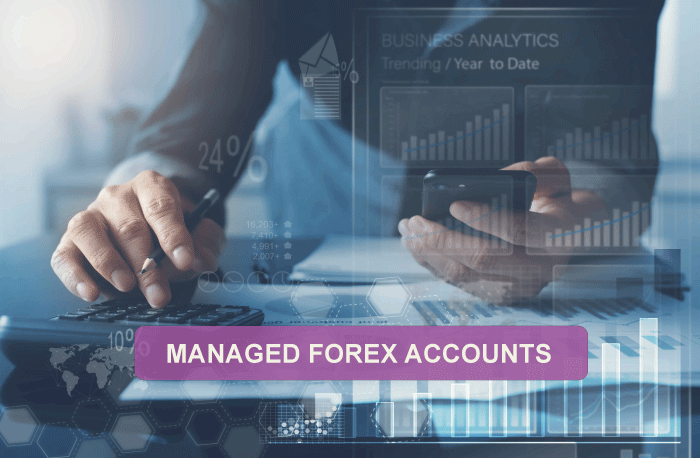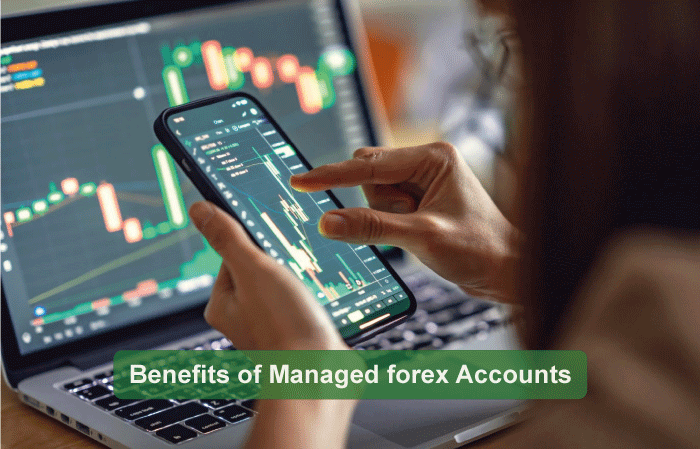Managed Forex AccountsWhat exactly are Managed Forex Accounts?The managed forex account is a currency trading account in which a professional money manager executes trades and transactions on behalf of the client for a fee. 
Individual investors who are not currency experts but wish to gain exposure to this asset class can choose a managed forex account. Managed forex accounts are also frequently selected as sub-advised funds for money managers who want to include a currency component in their portfolio but do not specialize in foreign exchange (FX) trading. In-depth Understanding of Managed Forex AccountsManaged forex accounts are an investment opportunity for those seeking potential gains from leveraged forex trading, are willing to face significant risks, and want specialists to handle the selection and trading. It entails depositing funds in a forex account and having a professional trade on those funds in the highly leveraged foreign exchange markets. Investors who choose this type of account do so with the anticipation of extraordinarily big gains but with the awareness that they may also face severe losses. Managed forex accounts expose an asset class that differs greatly from stocks or bonds. Forex trades gain value as the value of one currency rises or falls concerning another, unlike more traditional securities, which provide returns in the form of share growth, interest payments, or dividends. Those who invest in currencies do so either to hedge risk in international markets or as speculators who recognize the potential for large shifts in pricing and values between global markets. Individual investors and speculators typically open forex accounts and trade using their knowledge. Many amateurs find this notoriously difficult and prefer managed forex accounts, but the few who succeed can earn extremely high returns-sometimes even higher than the return on equities. Using the services of a professional manager is a good way to avoid the extra time, effort, and loss that inexperienced traders in this market face. It is hoped that a more experienced professional can be relied on to deliver great returns. What are the benefits of Managed Forex Accounts?
There are various benefits to choosing managed forex account. Listed below are a few of them: Offers Direct OversightOne of the best things about managed forex accounts is that individuals have control over when to invest and when to withdraw. Sometimes, the PAMM (percent allocation management module) system even allows one to put in a stop loss level. This is an instruction to tell the broker to stop copying the trader's trades on the client's account if the account goes below a certain level. This is essential as one can be able to protect at least some of their capital. Offers a great SecurityManaged forex accounts often ask an individual to fund an account with a regulated broker. This is important as unregulated brokers do not have any regulatory oversight, and an individual might want to ensure their capital is safe. One of the best features of forex-managed funds is that one only deposits funds with the broker. The fund manager never asks to send the funds to a personal bank account - if they do, beware! This is because the PAMM/LAMM/MAM systems operate via a letter of power of attorney. This is where the client gives the trader authorization to trade on their account, but they cannot withdraw money or move the funds. Provides a Good Learning CurveThe foreign exchange market operates 24 hours a day, five days a week. Most beginner traders simply need more time to capitalize on all the opportunities the forex market can provide. Having a professional helps, who constantly dedicates all their time to finding the best setups and growing their client's account is an ideal way to capitalize on the foreign exchange market. It's also a great way to learn more about how the forex market works and how to trade different investment accounts. Some Points to ConsiderThere is nothing wrong with using managed forex accounts, but there are some essential things that investors should be aware of:
What is the role of Costs and Safety in Managed Forex Accounts?Foreign exchange markets are frequently used by sophisticated traders who use their ability to handle large amounts of borrowed money to increase their profits. They have more liquidity and trade much faster than stock and bond markets-in fact, forex is the world's most active market. Additionally, the lower transaction costs make it a popular forum for those who enjoy the thrill of speculation. At the same time, forex markets can be dangerous for inexperienced traders who lack a sophisticated understanding of the effects of high leverage on their returns and a good perception of how different news events, such as economic releases or central bank monetary policy decisions, affect currency prices. Ordinary investors can benefit from the expertise of an experienced and proven forex trader by using a managed account. The disadvantage of this strategy is that the best managers typically charge high-performance fees ranging from 20% to 30% of a trade's earnings or account profits. How do managed forex accounts operate?When someone opens a managed forex trading account, an account manager (or a team of traders) will trade on behalf of the customer and invest his capital alongside other investors, buying and selling currencies. The accounts managers have discretionary power over the funds: they make the decisions and don't consult the client before they trade. They may also charge a performance fee, so they only get paid when they make money for the client. How to fund the Forex Account?Investors can log in to their respective forex accounts, type in their credit card information, and the funds will be posted into their accounts in about one business day. Investors can also transfer funds into their trading accounts from an existing bank account or send the funds through a wire transfer or online cheque. Clients can also usually write a personal or bank cheque directly to their forex brokers. However, this takes longer, of course. What is the best account type for Forex?The standard trading account is the most common. This account gives users access to standard lots of currency, each worth $100,000; it does not mean you must put down $100,000 of capital to trade. The rules of margin and leverage mean that only $1,000 needs to be in the margin account for one standard lot to be traded. However, mini-accounts are recommended for beginners, more risk-averse traders, or those with limited funds. They reduce the maximum lot size to just $10,000. Most mini-accounts can be opened with $250 to $500, and they come with leverage of up to 400:1. The Bottom LineAt some point in their trading career, traders that do not reach a very high level of success with their skills start to think about using a managed forex account. Of course, exceptional traders can earn themselves after a little practice and learning. Still, for most of the beginning forex operators, the frustration of losses and the inability to learn over a long period leads to the conclusion that they should use forex account management services. Trading yourself and simultaneously having investments in some managed Forex accounts is also possible. Diversification is always great; even highly successful traders take advantage of the opportunity to invest in well-managed Forex accounts.
Next TopicPlutocracy Definition
|
 For Videos Join Our Youtube Channel: Join Now
For Videos Join Our Youtube Channel: Join Now
Feedback
- Send your Feedback to [email protected]
Help Others, Please Share










